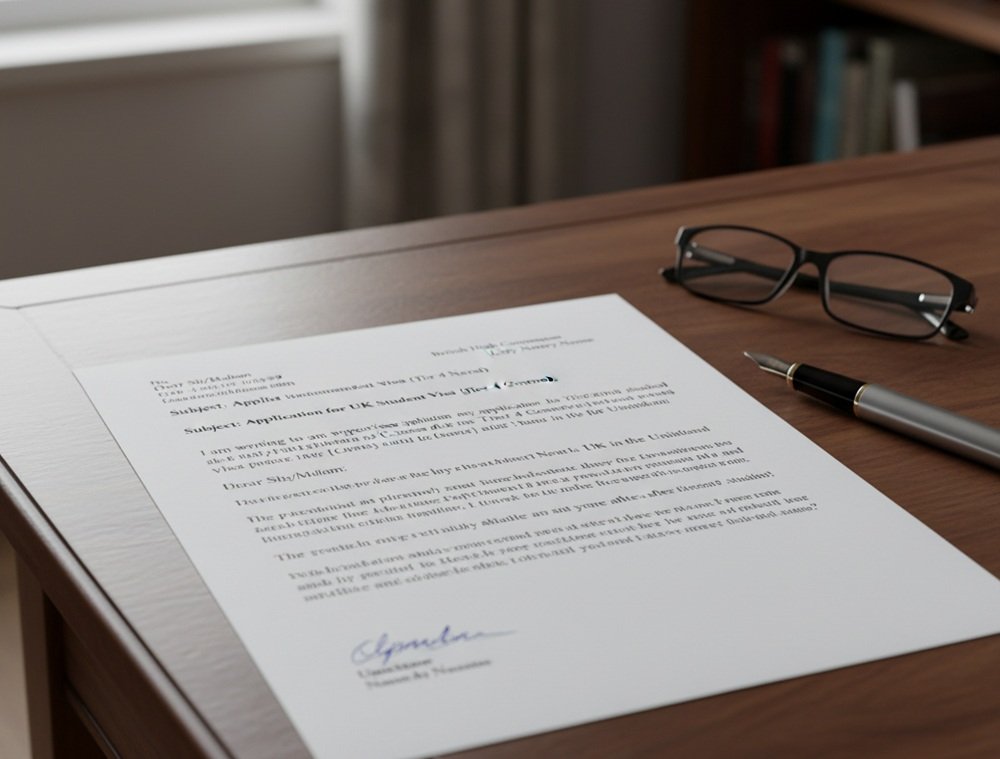Wants to know how to write a strong UK student visa cover letter?
Whether you’re dreaming of completing your higher studies at Oxford or enrolling at a university in London, getting your student visa sorted is an important step.
And guess what? One of the most helpful (and often overlooked!) parts of your visa application is your cover letter.
Don’t worry—it’s not as scary as it sounds.
In fact, think of it as your chance to tell your story in your own words.
To be honest, a well-written cover letter can really change the visa officer’s decision.
So grab your favourite drink, get comfy, and let’s walk through everything you need to know when it comes to writing a UK student visa cover letter, as it is that important.
Table of Contents
ToggleWhat Is a UK Student Visa Cover Letter?
Alright, first things first—what even is a cover letter for a UK student visa?
To put it simply, it’s a short, personal letter you include with your visa application that explains who you are, why you’re applying to study in the UK, and how you plan to fund your studies.
As a matter of fact, it’s not a formal essay or a legal document.
Instead, it’s your opportunity to speak directly to the visa officer who is reviewing your file.
To make it more simple, it’s like you’re basically saying, “Hey, here’s my plan, and here’s why it makes sense.”
Whereas the cover letter ties together all the official documents—like your offer letter, bank statements, and academic transcripts—into a clear, logical story.
Furthermore, it shows that you’ve thought things through and aren’t just applying without a purpose.
To be clear, this isn’t the same as a personal statement from a university application.
That one’s about your passion for the subject and your academic journey. While this one is more practical.
Because it’s about your intentions, preparedness, and understanding of UK visa rules.
Therefore, think of it as your “I’ve got this” letter.
Why the Cover Letter Is Important for UK Visa Approval
Now, you might be wondering: “Do I really need this? Won’t my documents speak for themselves?”
Well, those are fair questions! But here’s the thing—visa officers review hundreds, sometimes thousands, of applications.
In fact, they’re looking for red flags, inconsistencies, or signs that someone might overstay their visa.
In that case, your cover letter helps to clear up any doubts before they even arise.
Whereas it shows that you’re serious and fully aware of the major that you are planning to study in the UK.
Moreover, the UK Home Office wants to ensure that you’re a genuine student and not someone using a student visa as a backdoor to live or work in the UK long-term.
Therefore, a thoughtful cover letter demonstrates your genuine intentions to study, return home after your course, and follow all the rules.
For that reason, it can seriously boost your chances of approval.
Conversely, skipping it—or writing a vague, copy-pasted one—might leave the officer guessing, and that’s never a good position to be in.
Key Components of a Strong UK Student Visa Cover Letter
So, what should actually go into this letter?
Well, it doesn’t need to be fancy. But it does need to hit a few key points clearly and honestly.
As for the first point, start with your basic info: your full name, passport number, date of birth, and contact details.
Then mention the course you’ve been accepted to, including the university name, course title, and start date.
This shows you’re applying for a real, confirmed place—not just daydreaming.
Next, explain why you chose that specific course and university.
Was it the faculty? The research opportunities? Or the location?
In fact, be specific as it proves you’ve done your homework.
After that, talk about your academic background briefly.
Like, how does your past study prepare you for this course?
Then comes the financial part, where you need to confirm that you have enough funds (or sponsorship) to cover your tuition and living costs, and mention where that money is coming from.
Note: Savings and bank statements can prove funds.
Finally, reassure them that you understand your visa conditions and plan to leave the UK after your studies.
Trust us, that last bit is quite important.
That is because the Visa officers need to feel confident that you won’t overstay.
Step-by-Step Guide: How to Write a UK Student Visa Cover Letter
Okay, let’s get practical now.
Here’s a simple, step-by-step way to write your cover letter—without staring at a blank page for hours or guessing every word.
Addressing the Letter
First of all, don’t overthink the opening.
Just start with a polite and straightforward greeting like “Dear Visa Officer.”
In fact, you don’t need to hunt down someone’s name or write “To Whom It May Concern”—that’s outdated and sounds stiff.
Just writing, “Dear Visa Officer”, is perfect: as it is respectful, clear, and exactly what they expect.
Writing the First Paragraph
Now, your first paragraph should do one thing really well: whereas it should tell them who you are and why you’re writing this.
In this case, keep it simple.
For example: “My name is Sam in Sri Lanka, and I am applying for a Student visa to pursue an MSc in Data Science at the University of Edinburgh, with a course start date of September 2025.”
That’s it! No fluff, no drama—just the facts.
Trust us, writing like this sets the perfect buildup and shows that you’re organised right from the beginning.
About Your Choice of Course
Next, talk about the reason for choosing “your course?”
As a matter of fact, this is where you get to show some personality—but stay on the clear path.
As in, don’t just say, “The UK has excellent education.”
This is because everyone says that.
Instead, ask yourself. Did I choose this course because it offers a module on AI ethics that aligns with my undergrad thesis? Or because the university partners with tech companies for real-world projects?
Therefore, by doing so, you will get some effective points to include in your letter.
About Your Academics and Professional Background
After that, talk a little about your academic or professional background.
Where you could briefly mention your most recent qualification—like your bachelor’s degree—and how it prepared you for this next step.
On the other hand, if you’ve worked in a related field, mention that too!
For instance: “After completing my BSc in Computer Science, I worked as a junior data analyst for two years, which deepened my interest in predictive modelling and inspired me to pursue advanced study.”
Now, what if there’s a gap in your timeline?
Maybe you took a year off to support your family or travelled while saving up.
Well, that’s totally fine, but address it briefly and honestly.
Something like: “I took a 12-month break after graduation to care for a family member, during which I also completed an online certification in Python programming to stay engaged with my field.”
Note: Gaps aren’t red flags if you explain them positively.
About Your Financial Facts
Then comes the money part—and yes, it’s important.
In this case, you don’t need to dump your entire financial history into the letter, but you should clearly state that you (or your sponsor) can cover both your tuition and living costs as required by UK Visas and Immigration (UKVI).
When writing this part, keep it simple as well, like, “I have full financial support from my parents, who have maintained a dedicated education fund in a savings account for the past five years.” Or: “I have been awarded a full tuition scholarship from the Commonwealth Scholarship Commission, and my living expenses will be covered by my personal savings held in my name.”
Note: The key is to show that the funds are genuine, accessible, and meet UKVI requirements without going into bank balances.
About Your Post-Study Plans
Now, here’s a part many people skip—but shouldn’t: your post-study plans.
Trust us, visa officers need to believe that you’ll leave the UK when your visa ends.
So say it plainly: “Upon graduation, I plan to return to Nigeria to join my family’s tech startup as a data strategy lead, where I’ll apply the advanced analytics skills I’ve gained in the UK.” Or: “I aim to use my skills in India’s growing fintech sector by working with a leading digital banking platform in Mumbai.”.
Ending the Letter
Finally, wrap it up warmly but professionally.
In point of fact, a simple closing like: “Thank you for considering my application. I’m excited about this opportunity and happy to provide any further information if needed.
Moreover, add a handwritten signature if you’re printing and mailing (less common nowadays).
But if you’re uploading digitally, just use your typed name, which is OK.
And one last tip: read your letter aloud before you hit “submit.”
Ask yourself, Does it sound like me? Does it flow naturally? Would it make sense to someone who knows nothing about me?
And if the answer to those questions is yes, that’s great!
If not, tweak a sentence or two. Oh, and double-check the university name, course title, and start date.
Whereas getting those wrong—even by a typo—can raise unnecessary questions.
Common Mistakes to Avoid in Your Visa Cover Letter
Even smart, well-prepared applicants slip up sometimes.
Therefore, let’s talk about the usual mistakes so you can overcome them.
To begin with, one big mistake is being too vague.
As in saying “I want to study in the UK because it’s a great country” won’t cut it.
This is because Visa officers hear that all the time.
Instead, show you’ve researched your course and university.
Another common mistake is copying someone else’s letter or using a generic template without personalising it.
Trust us, officers can spot that from a mile away.
Also, don’t forget to mention your intention to leave the UK after your studies.
It sounds obvious, but loads of people skip this—and it’s a major red flag.
Conversely, don’t over-explain or include unnecessary details.
Whereas you don’t need to list every class you took in high school or your entire family tree. Just stick to what’s relevant.
Oh, and please—don’t lie. If your funds come from a relative, say so. If you have a scholarship, name it.
That is because making things up might seem like a shortcut, but it can lead to an instant refusal and even a ban.
Finally, avoid emotional pleas like “Please give me a chance” or “This is my only dream.”
Like we mentioned in the beginning, stay professional and factual.
Your passion should come through in your reasons, not in dramatic language.
Tips to Make Your Cover Letter Stand Out
Now, how do you make your letter perfect—in a good way?
Well, the most important thing is to be authentic.
To put it more simply, just write like yourself.
If you’re naturally upbeat, let a little of that shine through (while staying respectful).
On the other hand, if you’re more of a serious character, that’s fine too because clarity matters more than flair.
Anyway, make sure to use simple, everyday language.
Whereas you don’t need fancy words like “utilise” when “use” works just fine.
In addition to that, short sentences are your best bet. As they’re easier to read and less likely to be confused.
Also, structure your letter so it flows logically, like: who → why → how → what next.
Another tip we can give you is to read it out loud before submitting.
In case if it sounds awkward or robotic, change the words.
Just imagine you’re explaining your plans to a friend over coffee—as in that’s the tone you must aim for.
Furthermore, double-check all names, dates, and numbers. That is because a typo in your course start date could raise unnecessary questions.
Lastly, personalise it for each application if you’re applying to multiple schools.
Speaking of which, even if you’re using the same course type, each university has unique strengths.
Therefore, showing that you are aware of the process makes them to believe that you’re serious about this.
Conclusion
So there you have it!
Writing a UK student visa cover letter doesn’t have to be stressful or complicated.
If you think about it, it’s just you explaining your plans clearly and honestly.
Anyway, remember that visa officers aren’t there to refuse your visa; they just need to be sure that you’re a genuine student with a solid plan.
Therefore, by covering the key points, avoiding common mistakes, and keeping your tone friendly but professional, you’ll give your application a real boost.
For that reason, take your time, be truthful, and trust that your preparation will pay off.
You’ve got this!
Contact TEVS a UK student visa consultants in Sri Lanka to get UK student visa.
FAQs
Yes, even though some applicants don’t focus much on this, it’s highly recommended.
Keep it to one page—around 300 to 500 words.
Only if you’re applying to the exact same course at each, otherwise, change it!
Yes, but briefly. Just confirm that you have enough funds and mention the source.
Friendly but professional—like you’re explaining your plans to a helpful advisor.
Suggested Reads:
- Student Visa UK Employer Guidance
- Can You Work on a Student Visa in UK
- Top Student Visa UK Refusal Reasons
- Student Visa UK Show Money







